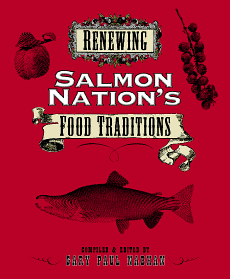You are currently browsing the category archive for the ‘environment’ category.
Very important environmenal piece:
Natural Capital
Watershed Watch , because sometimes, nature knows best. I recommend the full version found here. . .nice animation, and delivery.

Among all the “food nations” of North
America, Salmon Nation is the richest in
mushrooms, berries, wild roots, fish, and
shellfish. Native American traditions are at its
core, but other culinary accents – from Spanish
to Japanese – have added to the mix. Renewing
Salmon Nation’s Food Traditions describes over
180 species of local plants and animals – many
now at risk, others recovering, and all deserving
of recognition – that have formed the basis of
food traditions in the Pacific Northwest.
This illustrated handbook brings together
farmers, chefs, fisherfolk, food historians, orchardists,
activists, educators, and wild foragers in an
unprecedented effort to assess the current state of
foods unique to the Pacific Northwest. The result is
a comprehensive guide to the foods that have nurtured
Salmon Nation for centuries.
Renewing Salmon Nation’s Food Traditions
describes the appearance and taste of each species,
its origin and history, geographic range, and
culinary uses. Foods range from the Bing cherry,
Hood strawberry, and Nez Perce bean to Chinook
salmon, candlefish smelt, and geoduck to wild
items such as Oregon black truffle, wapato, and
blackcap raspberry. A resource list provides names
of nurseries, seed companies, and suppliers working
to safeguard and revitalize the heritage foods of
Salmon Nation.
Since green politics emerged as an ideology, it has been defined by a few key green principles. The German Greens drafted the earliest statement of this kind, called the Four Pillars of the Green Party. The Four Pillars have been repeated by many green parties worldwide as a foundational statement of the green ideology:
* Ecological wisdom
* Social justice
* Grassroots democracy
* Nonviolence

 Christy Moormann
Christy Moormann